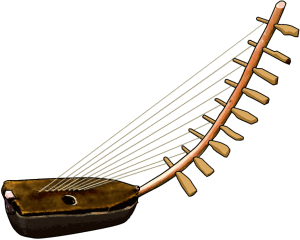I had the privilege of being able to live in Uganda for 1 year when I was younger. I say privilege, because I know that not everyone has the opportunity to travel. But also a privilege because it is an absolutely stunning country with beautiful, warm and welcoming people. As soon as I stepped off the plane I felt like I came home. Living in the village of Hoima, I was immediately embraced as one of the Banyoro people, was adopted by a family, ate their food, wore their clothes, learned their language (or...20% of it) and was given a "pet name", according to their cultural custom, which was Abwooli (cat-like). If it weren't for the children shouting, "Hey mzungu!!" (white person) several times a day at me, I could have convinced myself that I, too, was Banyoro.
I had the interesting task of teaching piano to the locals, even though no one had a piano. There was one piano that some church from the U.S. had donated to the community, and it was rather temperamental. How was I supposed to teach people piano when they couldn't practice at home?? I did the best I could with what I had, and I made paper pianos for each of them to take home and do the fingering. The number of my students grew to 25 and through some astonishing persistence on the part of my students, progress was made as the year went on, and one of my students even went on to continue playing piano in Kampala (the capital city). But it was also a humbling experience; In a culture where gardens are life, and gardens require a lot of attention and care, I had a lot of absentee students and no-shows, whether it was potato harvesting season, or because cows trampelled on their bean crops and they had to quickly replant them, or it was weeding time, or what have you. I had my days where I felt teaching piano in that culture was pretty useless. But the people loved it, and they wanted me to stay forever! There is always a place for music, and a music teacher, I suppose.

Early in the year I spotted a small harp-like instrument, made of wood, covered with fur and had 9 strings. It was called an adungu. I bought it without a moment's hesitation. It was a dream of mine my entire life to play the harp, and they say the harp calls to you. Well, that one did. Over the year I wrote over 100 little tunes on my adungu, adjusting the strings to create different modes, and I ended up with 18 modes. Over the past few years I have been re-recording those tunes and embellishing them with other instruments, and they can all be found in my Inspired Songs playlist on my Youtube channel, or in the "Listen" section of this website. The song below was originally an adungu song I wrote, which I then turned into a choral piece in 2003, and had a group of friends sing it with me, with the awesome addition of a djembe. Have a listen!
The lyrics are in the local language of the Banyoro people, Runyoro, and are very simple due to my limited knowledge of the language.
Ruhanga Linda (God cares for us)
Ruhanga Gonza (God loves us)
Jesu atugonza (Jesus loves us)
Jesu atulinda (Jesus cares for us)
Atulinda obutukucurra (He cares when we cry)
Aija kutuhimba (He will carry us)
Aleluyah, atugonza (Alleluia, he loves us)
Takwenda obutukubihirwa (He doesn't like when we suffer)
Atulinda obutukucurra (He cares when we cry)
Aija kutuhiliriza obutukusaaba (He will listen to us when we pray)
Aleluyah, atugonza (Alleluia, he loves us)
Yet another example that music, and love of music, crosses barriers created by time, distance, culture and language, and unites us together.



